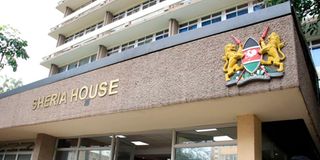Stop harassment of women, girls seeking abortion care

Sheria House in Nairobi. The Attorney-General should initiate the process of aligning the Penal Code with the Constitution to seal loopholes that lead to harassment of patients seeking abortion care.
What you need to know:
- Treating unsafe abortion complications generates huge costs to the Kenyan health system, families, and communities.
- The government should demonstrate political will to implement the constitutional provisions for reproductive rights.
The 2010 Constitution, which was overwhelmingly approved by 67 per cent of Kenyans through a referendum, gave a framework for reproductive health, including abortion care as a fundamental human right. It addressed the historic abortion stigma by clearly outlining circumstances under which abortion is permitted: if, in the opinion of a trained health professional, there is need for emergency treatment, or the life or health of the mother is in danger, or if permitted by any other written law.
Unfortunately, despite such a constitutional win, Kenyan women and girls continue to experience obstacles when accessing essential services.
Such barriers are manifested by the endless police harassment and arbitrary arrests of health providers, women, and girls — some survivors of sexual violence — for providing and seeking abortion care. The criminalisation of access to abortion care not only erodes the fundamental right to highest attainable standards of reproductive health care, but also creates a chilling effect among providers who shy away from offering safe legal abortion care to millions of Kenyan women and girls in need of such essential health services.
The compounding consequence is the increased cases of preventable maternal deaths and injuries from unsafe abortion. Prior to enactment of the 2010 Constitution, a report by the World Health Organization indicated that unsafe abortion accounted for 35 per cent of maternal deaths in Kenya — and it was the recognition of this very driver that contributed to constitutional provisions for safeguarding reproductive rights. Kenya loses 2,600 women and girls annually from unsafe abortion.
A report by the Guttmacher Institute and Ministry of Health revealed that an estimated 464,690 induced abortions occurred in 2012 and an estimated 157,762 women received care for complications of induced and spontaneous abortions in health facilities.
Accessing abortion care
Treating unsafe abortion complications generates huge costs to the Kenyan health system, families, and communities. To contextualise the burden, it requires seven hours of healthcare personnel time to treat moderate unsafe abortion complications, and up to 12 hours to treat severe complications involving procedures such as pelvis abscess drainage or vaginal tear repair.
In 2012, the government spent Sh432.7 million to treat patients seeking post abortion care. In 2016, the figure increased to Sh553 million, and it is highly likely that subsequent figures are more harrowing.
The difficulties faced by trained mid-level providers — clinical officers, nurses, midwives — and women and girls are exacerbated by the government’s lackadaisical approach towards enforcing constitutional provisions on access to reproductive rights.
There is outright failure to acknowledge that the 2010 Constitution redefined the legal context for accessing abortion care. The government still applies the archaic 1963 Penal Code that blatantly criminalises all abortion care, including the legally permissible exceptions.
The government’s non-committal approach in aligning the 1963 Penal Code with the 2010 Constitution has manifestly sabotaged efforts to strengthen key institutions and agencies mandated to protect women’s health. It has frustrated the implementation of progressive pronouncements by the judiciary on matters relating to reproductive rights.
Dangers of abortion stigma
One instance is the case of ‘JMM’, a minor who was sexually assaulted, impregnated, sought unsafe abortion, and failed to receive quality post abortion care, ultimately leading to her death. In its ruling, the High Court connected the death of JMM to government’s unlawful withdrawal of the Standards and Guidelines for Reducing Morbidity and Mortality from Unsafe Abortion in Kenya, a policy document that guided health care providers on when and how they could provide safe and legal abortion and post-abortion services.
Among other orders given by the five-judge bench in this case was for the government to reinstate the Standards and Guidelines — but the Ministry of Health has not complied with the order. Another example of government’s lack of commitment in curbing unsafe abortion is the 2018 ban of Marie Stopes Kenya from offering abortion care and mass dissemination of information about the causes and dangers of abortion stigma.
Preventable maternal deaths and injuries from unsafe abortions can only be reduced if the government demonstrates political will to implement the constitutional provisions for reproductive rights. The effort will also demonstrate Kenya’s commitment to Sustainable Development Goals for ensuring access to comprehensive reproductive healthcare, including family planning, information and education, and integration of reproductive health into national strategies.
Through the Attorney-General, the government must initiate the process of aligning the Penal Code with the Constitution to seal loopholes that pave way for harassment and extortion of providers and patients seeking abortion care.
Through the National Police Service and Office of Director of Public Prosecutions, the government must ensure police and prosecutors are trained on interpretation and application of the constitutional provisions on abortion to prevent women and girls from being arbitrarily arrested and prosecuted for seeking healthcare protected by the Constitution.
Evelyne Opondo is Senior Regional Director for Africa at Center for Reproductive Rights





